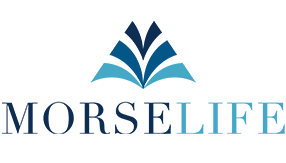
Turning Home Equity into a Secure Retirement at MorseLife
Your home is more than a place filled with treasured memories and keepsakes. It’s also often your most valuable financial asset. When it comes time for retirement planning, it may be the key to securing your worry-free lifestyle.
Whether you’re considering options for yourself or helping a parent navigate this transitional time of life, understanding how to leverage home equity wisely can help you foster a future of comfort, dignity, and continued independence.
MorseLife understands the importance of clarity and thoughtful guidance in senior living and retirement planning.
As a trusted leader in senior living and care for over four decades, our goal is to help seniors and their loved ones make informed decisions that enhance quality of life.
In this article, we’ll examine how home equity can fund senior living. We’ll review potential strategies ranging from selling your home to reverse mortgages and equity-based loans.
Fast facts about home equity and senior living
Before we dive into options, it’s helpful to review some relevant data and info that highlights why home equity is a powerful resource for many seniors.
- Home equity defined: Home equity is the difference between your home’s current market value and what you still owe on your mortgage. For example, if your home is worth $600,000 and you owe $100,000, you have $500,000 in equity.
- Rising home equity among today’s seniors: At of the start of 2024, homeowners aged 62 and older held a collective $13.19 trillion in home equity. This represents a record high, up from 13.08 trillion in 2023.
- A primary retirement asset: For many older adults, home equity represents their largest single source of net worth, according to Federal Reserve data.
- Additionally, the National Bureau of Economic Research (NBER) found that housing assets represent 67% of the median per capita net worth for adults over the age of 65, making home equity the primary self‑funding mechanism for long‑term care.
- Growing demand for long-term care: About 70% of people age 65 or older will need long-term care services at some point in their lives, according to the U.S. Department of Health and Human Services.
- Average home sale timeline: Homes in the U.S. often stay on the market for an average of 45 to 60 days before closing, which can delay access to funds if selling is your chosen strategy.
These statistics highlight the financial opportunities many seniors already have access to and show why leveraging accrued home equity can be a strategic move to finance your secure retirement.
Next, let’s explore some options to put your home’s equity to work for you in retirement.
Option 1: Selling your home
Selling your home is the most straightforward and flexible way to access the equity you’ve built. Proceeds from the sale can go to cover the costs of Independent Living, Assisted Living, Memory Care, or other services within the MorseLife care continuum.
This option also frees you and your loved ones from the ongoing costs and responsibilities of maintaining a home, including insurance, repairs, taxes, and utilities.
At MorseLife, we don’t require an exorbitant entrance fee to join our senior living communities. Instead, we request a reasonable, one-time community fee and offer a simplified and transparent monthly rate that includes many of the amenities, support, and vibrant lifestyle our residents enjoy every day.
While our exceptional Levin Palace Independent Living community offers the ease and freedom of all-inclusive living, our Tradition and Resnick communities provide families with the ability to customize their care services from our tired offerings, so they can personalize and prioritize what’s needed.
Whether you’re downsizing for greater freedom and independence or seeking additional support to live a life of enhanced purpose, security, and enjoyment, our MorseLife team can help guide your transition with confidence and insight.
Option 2: Reverse mortgages
A reverse mortgage allows qualified homeowners aged 62 and older to borrow against their home’s equity without selling or moving. It can allow you to remain in your home while drawing from its equity. The funds can be received as a lump sum, monthly payments, or a line of credit, and repayment isn’t required until you move, sell, or pass away.
Unlike traditional loans, reverse mortgages don’t require monthly mortgage payments. However, homeowners are still responsible for paying property taxes, insurance, and maintenance costs. This option may be ideal for those who wish to age in place for the short term but want to plan for a future transition.
Visit the Consumer Financial Protection Bureau for unbiased information about reverse mortgages to determine if this option is right for you.
Learn tips for estate planning to promote a stress-free senior living transition.
Option 3: HELOC vs. home equity loan
If you’re not ready to sell your home or use a reverse mortgage, there are other ways to borrow against your home’s value. Two of the most common are a Home Equity Line of Credit (HELOC) and a home equity loan. They sound similar but serve different purposes.
Let’s explore how each can help you in using home equity for retirement.
Home Equity Line of Credit (HELOC)
A HELOC is a revolving line of credit, similar to a credit card, that allows you to borrow funds as needed based on your home’s equity.
You make interest only payments on what you use, and the rate is often variable. This can be a good option for covering unpredictable or fluctuating expenses, such as moving costs or Short-Term Care services.
Home equity loan
A home equity loan is a one-time lump sum with a fixed interest rate and monthly payments. It’s ideal for funding a specific, planned expense, such as the upfront costs of transitioning to a senior living community.
- They also typically require a property valuation/reappraisal to determine your home’s current value and the amount of equity you have available to borrow against. This information helps your lender determine your home’s current market value and assess their risk.
- In some specific cases, your lender may allow you to skip an in-person appraisal and still qualify you for a HELOC or home equity loan, particularly if you intend to borrow a smaller amount.
Discussing your options with your loved ones and a trusted financial advisor can help you determine which strategy best fits your goals and timeline.
Explore the potential hidden financial benefits to fast-tracking a move to senior living.
Using home equity to fund senior living at MorseLife
Many seniors underestimate how powerful their home equity can be in paving the path to the retirement lifestyle they’re seeking.
To know if the time is right to tap into your home’s equity for retirement, ask yourself:
- Is maintaining my home becoming physically or financially overwhelming?
- Would I benefit from a community environment with built-in support, amenities, and healthcare?
- Do I want to simplify my monthly expenses with predictable, all-inclusive pricing?
If so, the time may be right to explore home equity options.
How MorseLife helps seniors make strategic senior living funding choices
MorseLife supports seniors and their families to make the most of their resources, helping to reduce financial confusion for you and your loved ones and to create a smooth and seamless transition into a maintenance-free community lifestyle.
MorseLife offers:
- Predictable monthly rates, including a blend of all-inclusive and tiered rate structures for ease and customization
- No large down payments or buy-in fees
- Access to a full continuum of exceptional care services and senior lifestyle levels on one campus
- A wealth of innovative, research-based wellness, therapy, and enrichment programming
- Onsite healthcare and medical support
Whether you’re joining us for Independent Living, exploring Assisted Living for yourself or a loved one, or seeking the ideal Memory Care or Long-Term Care environment for a cherished family member, our communities are designed to support not only your physical, mental, and emotional health, but also your financial well-being.
Whether you plan to sell, borrow, or convert your home value into a funding source for senior living, the most important step is making an informed decision. With expert guidance, compassionate support, and a proven history of excellence in senior care, MorseLife is here to help you confidently make the most of your home equity.



